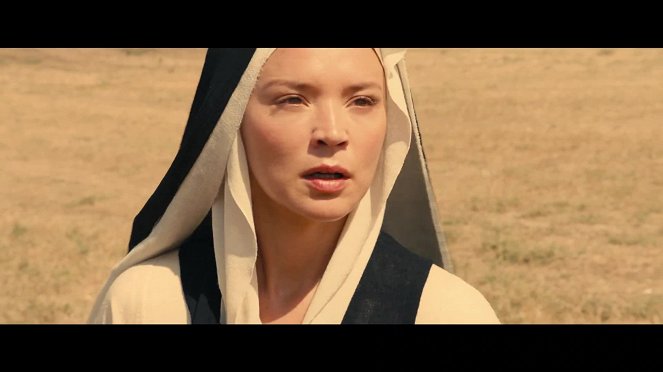Directed by:
Paul VerhoevenCinematography:
Jeanne LapoirieComposer:
Anne DudleyCast:
Virginie Efira, Charlotte Rampling, Daphne Patakia, Lambert Wilson, Olivier Rabourdin, Clotilde Courau, Louise Chevillotte, Hervé Pierre, Alexia ChardardPlots(1)
A 17th-century nun in Italy suffers from disturbing religious and erotic visions. She is assisted by a companion, and the relationship between the two women develops into a romantic love affair. (IFC Films)
Videos (6)
Reviews (9)
In an effort to track down the truth about the life of the lesbian nun Benedetta Carlini, Verhoeven employs the formula of historical biography to analyse the Church’s model of power, in which faith is only one of the means of survival and maintaining dominance. Until the end, the film does not give a clear answer as to whether the protagonist really communicates with saints and possesses mystical abilities, or whether she is merely capable of exploiting the fears of others. Due to the impossibility of a rational explanation of some of the events depicted in the film, both interpretations remain possible. As in Total Recall , there is not a clearly defined line between reality and illusions or dreams. In any case, the Dutch filmmaker approaches belief in the supernatural with cynical humour and a sense of the grotesque, both of which are apparent in the arrangement of the mise-en-scene, working with the aesthetics of contradiction and ambiguity, and in the composition of the shots. As a complex, ambivalent female character, Benedetta alternately elicits sympathy and repulsion. Though she promises her followers protection from the plague that is decimating the Italian population, she mainly pursues her own gratification. Salvation and redemption are only illusions. Unlike the unquestioningly listening, frightened and thus easily manipulated crowd, we see that it is not Jesus but rather the closed city gates that provide protection against the disease. No divine forces, just a lockdown. Besides her intelligence and charisma, what makes her a credible religious figure are the stigmata that she inflicts on herself with a shard of glass. Consequently, she can determine what God’s will is and cheerfully abuse the fact that each of the nuns interprets the language of God in her own way. For Verhoeven, religion is not a matter of inner conviction, but rather a culturally, geographically and historically defined phenomenon that serves momentary biological needs and the interests of power. Anything can be justified by God. A similar approach to the clergy is taken by other representatives of the Church, whose hypocrisy Benedetta points out through her own deeds as she retreats into the background in the second half of the film. After the arrival of the nuncio, she changes from a character who abused power in an ethically dubious way to a representative of the resistance against the system, using her own body and sexuality for emancipation. The struggle for dominance, which sets the dynamics of the narrative, is thus unpredictable and suspenseful until the final minutes of the film. Verhoeven typically is not judgmental, nor does he cheer for any side. With a sociological interest, he only studies from afar how easily – regardless of the period – faith can be transformed into an instrument of control and how much a person’s value and power depend on the given historical situation. 85%
()
Lesbian nunspoitation by Verhoeven set in a 17th century Tuscan monastery. Verhoeven has made an unconventional erotic religious drama that is not afraid of nudity and violence. The actress who plays Benedetta, Virginie Efira, looks very good at 45, and her full frontal nude will please many a male eye, but the rebellious Daphne Patakia looks good too – she is the hottest nun I have ever seen. The combination of sinful nuns and a corrupt Christian institution works surprisingly well. The historical period where Europe was gripped by the Plague, the very intense and exciting lesbian sex scenes, the Stigmata vignettes, the great nightmares of Benedetta (the snake scene or the brutal killing of the knights, surprised by the raw gore). I liked the harsh rules the nuns had to follow and the intense finale is solid, with a cool trial, torture and chaos of the townspeople. The pacing is slower in places, but the film managed to keep my attention thanks to the attractive interludes. Definitely a noteworthy affair.
()
Verhoeven devoted his entire oeuvre to bringing back to the sacred (genre) worlds the profane (excessively physical and emotional) aspects that had been pushed out of them by the previous tradition. His (perhaps only for now) last film thus represents a magnificent culmination of this effort, as he turns his attention to the Church itself, following his treatment of Hollywood genres and national historical milestones and local social phenomena. Benedetta thus delivers a caustically funny deconstruction of the Church as a pragmatic apparatus based on the illusion of hope. As in his previous films, this time Verhoeven offers a seemingly one-dimensional spectacle. But lying just below the wholly functional (in terms of genre) and, for many, outrageous, grim and entertaining surface, there is a broad spectrum of thought-provoking layers. For some, Benedetta will remain a cynical or even exploitative and objectifying mess, but for others it will be, among other things, a sophisticated portrait of the wonderfully ambiguous title character. Through her, personal and organised faith is revealed to be an instrument of institutional and personal power and, paradoxically, within a certain historical context, of possible emancipation, though only in the sense of career and existence, but peculiarly not in terms of personal freedom. And, through the protagonist’s development, it also shows that spiritual foolishness and physical orgasm have more in common than many want to admit.
()
Set in a 17th-century Italian convent against the backdrop of a plague epidemic, this erotic film about nuns is a rather uneven attempt to raise its B-movie foundation, drawing primarily on the tradition of Italian exploitation flicks with nuns (so-called “nunsploitation”), to the level of a top-tier festival film. Paul Verhoeven threw into it his trademarks and favorite obsessions including, for example, caustic irony, sadism and perversion, and feminism, in this case spiced up with a mocking critique of the Church as a hypocritical institution controlled by power interests and standing in the way of sexual freedom. We follow the story of a young nun, who is experiencing very vivid visions of manifestations of Christ and undergoing a lesbian awakening with a newly arrived novice, from her childhood in a series of sacrilegious escapades, whose true origins are shrouded in mystery (perhaps a divine miracle, maybe just an act with a profit-seeking objective) and are the driving force of the entire film. Through most of its runtime, the film veers between a low-brow black-humor farce about the abuse of believers’ gullibility (with flatulence, defecation, playful pornographic motifs and the figure of Jesus Christ in the role of protector, who fearlessly decapitates enemies and beasts) and an agonizing serious drama with classical music and naturalistic violence, dealing with a delirious woman prone to self-harm and the negative impacts of fanatical faith. The clash of these two tonally contradictory approaches is quite problematic and unsatisfying, but perhaps that doesn’t matter to Verhoeven, as he probably just wanted to have a good romp and be a bit provocative and outrageous, which he succeeded in doing. Because of that, Benedetta falls into the category of borderline guilty-pleasure entertainment suitable for midnight festival screenings that will divide audiences, and in which the acting highlight is not the performances of the actresses portraying the lesbian couple, but that of Charlotte Rampling in the supporting (though essential and noteworthy) role of the sceptical mother superior.
()
Benedetta has spent most of her life in a convent, but now besides God, she started to love Bartolomea... what initially appears as a drama about forbidden love, in Paul Verhoeven's direction turns into a provocative and unpredictable story that opens up a lot of interesting topics and cleverly manipulates with the audience, their expectations, and the way it processes what happens to the protagonists on the screen. Equally daring, cynical, clever, and entertaining as the director's greatest classics.
()



Ads